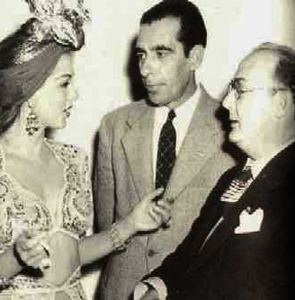4.2.9.1 “Cuban Sadness”, by Miguel de Marcos (1894 – 1954)

“Cuban Sadness” was published by Miguel de Marcos in the newspaper “Avance” in November 1938, earning him the prestigious “Justo de Lara” prize that same year. This piece follows the perspective of unmasking the joke as a way of concealing immense republican frustration. Although the political causes are not clearly expressed, they are intuitively apparent at a deeper level, from the Cuban’s doomed passivity and apathy.
The text offers a series of arguments regarding the falseness of the Cuban smile, as a way of escaping a consciousness of inferiority that has deep historical and political roots, beyond a mere shared vital attitude, whose causes the author does not attempt to unravel, but rather proposes unmasking, an active attitude toward one’s circumstances, in order to achieve a place as a people.
His capacity for social observation is somewhat lost in his ramblings about the subject, in which he nevertheless displays an uncommon erudition and a command of apt vocabulary, combined with a certain effectiveness characteristic of the purpose of inoculating his thesis, undoubtedly quite congruent with social reality, although perhaps lacking in some incomprehension of the magnitude of the forces that maintained the underhand subjugation; although of course not irreducible as the course of history itself would demonstrate.
The following statement is interesting for its political connotation, even though it does not clearly outline what opposes the social need for self-realization: “A people who cannot create their destiny with their own hands are not happy, despite the blue sky, the benignity of things and the grace of the landscape.”
Here, a sense of Cubanness is present that goes beyond the scope of the natural environment in its emotional connotation, whose symbolism overlaps but does not constitute all of Cubanness. It refers to the blue sky, not yet usurped but the land had already been usurped in large estates and the placid landscape expropriated.
Likewise, it goes beyond costumbrismo, which was aesthetically stopped in the ways of life of the Cuban, in the picturesque of everyday life, to show another dimension of public and private life, what was hidden behind a joviality as detachment, alienation, in the face of circumstances that loom over the individual as unavoidable and the author already brings the first nuncios that it does not have to be this way, opposing another determination.
The text concludes with this paragraph: “Cubans are sad, and for that very reason, there is a Cuban sadness. (…) A Cuban sadness that needs to be broken, that needs to be exorcised, to install in the place of that abolished ghost, true joy, the kind that laughs and reasons, the kind that makes its laughter a force, a firmness and a wisdom, an irrefutable creation and a serenity, a robust joy—that of today, without the words of yesterday—that which infuses the hours with courage, that which does not insert into the present, into the present, past declamations of mournful obsolescence.”








